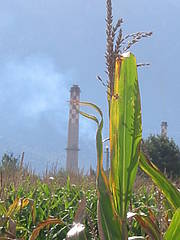Finding a food-free fuel solution
06 September 2012 | Article
“Food should be used for people and not for energy,” says Doris Cellarius, Chair of the Biofuels Task Force at Sierra Club, an IUCN Member.
According to Cellarius, biofuels are not the answer to solving the world’s energy problem. Instead, she believes renewable energy, conservation and improved transportation are more viable solutions to the energy crisis.
“Countries should switch to biofuels that can be produced without growing crops,” said Cellarius. “One example would be waste cooking oil, which is more sustainable and has no impact on food or water supplies.”
While some countries believe corn and soy-based biofuels could be the next generation of fuel for transportation, Cellarius and others are calling attention to the impact these products have on food supplies around the world. With biofuel mandates introduced by over 50 national governments, there is increasing recognition that such mandates must be accompanied by policies to mitigate direct environmental and social impacts. They should also consider the risk of indirect impacts to food security and land use.
Biofuels will be a recurring topic at the 2012 IUCN World Conservation Congress, which kicks off tomorrow in Jeju, Korea. “Biofuels are solving only a tiny part of the fuel solution while having a dramatic impact on so many other areas, from food supply to the environment,” says Cellarius.
The views in this article are not necessarily the views of IUCN, for more information on IUCN’s work on biofuels please see http://www.iucn.org/what/tpas/energy/key/biofuels/
See the full programme of Congress events at http://events.iucn.org/wcc2012/official_programme




